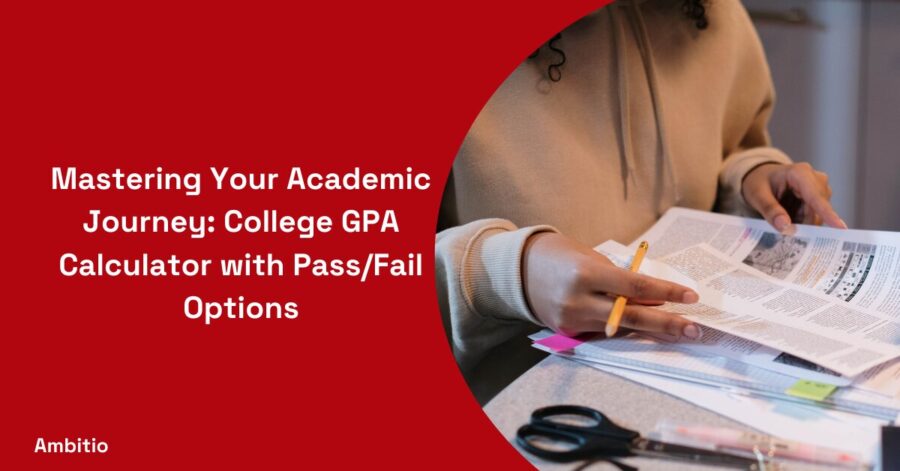13 December 2024
7 minutes read
Mastering Your Academic Journey: College GPA Calculator with Pass/Fail Options

Introduction
College life is an exciting journey of growth and learning. However, understanding and managing academic performance is crucial. Your GPA (Grade Point Average) is a key indicator of this performance.
With different grading systems, including pass/fail options, calculating your GPA accurately becomes essential. This is where a college GPA calculator becomes an invaluable tool, helping students navigate their academic paths with clarity and confidence.
The Importance of Accurate GPA Calculation in College
GPA is more than just a number; it’s a reflection of your academic accomplishments and can impact your future opportunities. Whether you’re aiming for honors, planning to apply for graduate school, or seeking scholarships, knowing your GPA is crucial.
Navigating Pass/Fail Courses in Your GPA
The inclusion of pass/fail courses in your academic journey adds complexity to GPA calculation. While these courses can alleviate pressure, understanding how they fit into your overall GPA is important.
The Role of Pass/Fail Courses in GPA Calculation
Pass/fail courses typically do not affect your GPA directly. A pass grade won’t improve your GPA, but a fail can harm it. A GPA calculator that includes pass/fail options provides a clearer picture of how these courses influence your overall academic standing.
Customizing Your GPA Calculator Experience
Every student’s academic journey is unique, and so should the way they calculate their GPA. Customization features in a GPA calculator can cater to different needs and academic systems.
Features to Look for in a Customizable GPA Calculator
A customizable calculator should offer options to input different grading scales, credit hours, and course types, including weighted, unweighted, and pass/fail courses. This level of customization ensures that the calculator is a reliable tool for a wide range of academic scenarios.
The Impact of Weighted and Unweighted Courses on Your GPA
Understanding the difference between weighted and unweighted courses is crucial in GPA calculation. Weighted courses can have a more significant impact on your GPA due to their increased difficulty level.
Balancing Weighted and Unweighted Courses
Striking the right balance between weighted and unweighted courses can strategically improve your GPA. Weighted courses, like AP or honors classes, can boost your GPA if perform well. On the other hand, unweighted courses provide a consistent baseline for performance measurement.
Strategies for GPA Improvement in College
Improving your GPA in college requires a combination of strategic planning, consistent effort, and smart study techniques. Here are some key strategies to help you boost your academic performance:
- Prioritize Your Coursework: Focus on the courses that carry more weight in terms of credits or difficulty level. Identify which courses have a greater impact on your GPA and allocate more study time to them.
- Seek Help Early: Don’t wait until you’re struggling to seek help. Utilize your professors’ office hours, join study groups, or get a tutor for subjects that are challenging for you.
- Manage Your Time Effectively: Develop a study schedule that balances your coursework, extracurricular activities, and personal time. Avoid cramming by studying a little each day, and start preparing for exams well in advance.
- Participate in Class: Active participation can sometimes contribute to your grade. It also helps you engage more deeply with the material, leading to better understanding and recall.
- Take Advantage of Academic Resources: Most colleges offer a variety of academic resources, such as writing centers, libraries, and online databases. Make full use of these resources to enhance your learning.
- Balance Course Load: Mix challenging courses with those you find easier or more enjoyable. This balance can prevent burnout and help maintain a steady GPA.
- Utilize Feedback: Pay close attention to the feedback on your assignments and exams. Understanding where you lost points can help you improve in future assessments.
- Improve Your Study Habits: Find a study method that works best for you, whether it’s group study, flashcards, or self-quizzing. Consistently good study habits lead to better understanding and retention of course material.
- Stay Healthy: Your physical and mental health plays a crucial role in your academic performance. Ensure you get enough sleep, eat healthily, and engage in physical activities.
- Set Realistic Goals: Set achievable goals for your GPA and work steadily towards them. Remember, improvement can take time, and it’s important to be patient and persistent.
- Reassess and Reflect: Regularly reassess your academic strategies and reflect on what’s working and what isn’t. Be open to changing your approach if necessary.
- Consider Course Withdrawal if Necessary: If you find yourself struggling significantly in a course, consider withdrawing before it negatively affects your GPA. However, make this decision carefully and discuss it with an academic advisor.
By implementing these strategies, you can make significant strides in improving your GPA and enhancing your overall academic performance in college.
Effective Ways to Boost Your College GPA
Boosting your GPA in college can be challenging, but with the right approach and strategies, it is definitely achievable. Here are some effective ways to enhance your academic performance and increase your GPA:
- Stay Organized: Keep track of assignment due dates, test dates, and other important academic deadlines. Use a planner or digital calendar to manage your time efficiently.
- Attend All Classes: Regular class attendance is crucial. It ensures that you don’t miss out on important lectures, discussions, and insights that could be vital for exams and assignments.
- Active Participation: Engage actively in class discussions and activities. This not only enhances your understanding of the subject but may also contribute to your participation grade.
- Understand Grading Policies: Know how your courses are graded. Understanding the weight of exams, assignments, and participation can help you focus your efforts more strategically.
- Quality Over Quantity in Studying: Focus on understanding concepts rather than just memorizing information. Quality study sessions are more effective than long hours of unproductive studying.
- Use Campus Resources: Take advantage of campus resources such as tutoring centers, libraries, and writing workshops. These can provide valuable assistance in strengthening your academic skills.
- Form Study Groups: Studying with peers can provide diverse perspectives and help clarify difficult concepts. It also keeps you motivated and accountable.
- Regular Review Sessions: Regularly review your notes and course materials. This helps reinforce your learning and reduces the burden of last-minute cramming.
- Seek Feedback from Professors: Don’t hesitate to ask for feedback from your professors on how you can improve in their courses. They can provide valuable insights into your performance and how to enhance it.
- Prioritize Mental and Physical Health: Maintain a healthy balance between studies and personal life. Adequate sleep, proper nutrition, and physical activity are essential for optimal cognitive function.
- Set Achievable Goals: Set realistic academic goals for each semester. Having clear targets can motivate you and provide a sense of direction in your academic endeavors.
- Practice Good Exam Strategies: Develop effective exam strategies, like answering questions you know first and managing your time wisely during the test.
- Improve Writing Skills: Strong writing skills can significantly improve your grades, especially in humanities and social sciences. Utilize resources like writing centers to hone your writing.
- Reflect and Adapt: Regularly assess your study methods and academic performance. Be open to changing your strategies if you find they’re not effective.
By implementing these methods, you can create a strong foundation for academic success, leading to an improvement in your GPA and a more fulfilling college experience.
Utilizing GPA Calculators for Academic Planning
A GPA calculator is not just for current GPA calculation; it’s a tool for future academic planning. By projecting future grades, students can set realistic goals and make informed decisions.
How a GPA Calculator Can Aid in Future Semester Planning
By entering hypothetical grades for future courses, you can estimate your future GPA. This foresight can be incredibly valuable for planning your academic trajectory, ensuring that you stay on track to meet your academic goals.
Decoding Your Transcript: Beyond GPA Calculation
Understanding your transcript is about more than just knowing your GPA. It’s about analyzing your academic progress comprehensively.
Interpreting Your Transcript with a GPA Calculator
Use a GPA calculator to break down your grades and credits by semester, giving you a clear picture of your strengths and areas for improvement. This analysis can guide you in course selection and academic focus areas in subsequent semesters.
The Future of GPA Calculation: Tech-Enhanced Tools
The future of GPA calculation is closely intertwined with advancements in technology. As educational tools become more sophisticated, the ways in which students calculate and understand their GPA are evolving. Here’s a look at how tech-enhanced tools are shaping the future of GPA calculation:
- Integration with Academic Systems: Future GPA calculators are likely to be integrated directly with university student information systems. This integration allows for real-time GPA tracking and updates as soon as grades are posted, providing a more dynamic and current view of a student’s academic standing.
- Artificial Intelligence and Predictive Analytics: AI-driven GPA calculators can analyze past academic performance to predict future GPA trends. These predictions can help students make informed decisions about course load and study strategies, as well as set realistic goals for academic improvement.
- Customization and Personalization: Tech-enhanced GPA calculators will offer higher levels of customization. Students will be able to input specific information about their courses, grading systems, and academic goals to receive a more personalized and accurate GPA calculation.
- Interactive User Interfaces: Future GPA calculators will likely feature more interactive and user-friendly interfaces. These may include visual representations of GPA changes over time, interactive graphs, and detailed breakdowns of course contributions to overall GPA.
- Mobile Accessibility: With the increasing use of smartphones, mobile-accessible GPA calculators will become more prevalent. This accessibility ensures that students can check and update their GPA on the go, fostering continuous engagement with their academic progress.
- Integration with Learning Management Systems (LMS): GPA calculators might be integrated with LMS platforms like Canvas or Blackboard. This integration can allow students to see how individual assignments and tests impact their overall course and GPA calculations.
- Enhanced Data Security: As these tools handle sensitive academic information, future GPA calculators will employ advanced data security measures to protect student privacy and academic records.
- Support for Diverse Educational Systems: Tech-enhanced tools will cater to a wide range of educational systems globally, accommodating different grading scales and academic structures, making them versatile for international students.
- Scenario-Based Planning: Future GPA calculators could offer scenario-based planning features, allowing students to input hypothetical grades for future courses and see potential impacts on their GPA. This can aid in course selection and academic planning.
- Feedback and Resource Recommendations: Advanced GPA calculators may also provide personalized feedback and resources for improvement. Based on a student’s GPA and academic history, the tool might suggest specific study resources, tutoring services, or workshops relevant to their needs.
- Collaboration Features: There might be features for collaborative planning, where students can work with advisors or peers within the calculator tool to set goals and plan academic paths.
- Analytical Reports for Long-Term Planning: These tools could generate comprehensive reports that analyze GPA trends over time, providing insights for long-term academic planning and goal setting.
Conclusion
In conclusion, a college GPA calculator with pass/fail options is an essential tool for any college student looking to accurately track and manage their academic performance.
Whether you’re balancing weighted courses, navigating pass/fail options, or planning for future semesters, this tool offers the clarity and precision needed for academic success.
FAQs
Q1: Can I use the GPA calculator for different education systems?
Yes, most GPA calculators are adaptable to various education systems and grading scales, making them useful for a wide range of students.
Q2: How often should I use a GPA calculator?
It’s beneficial to use a GPA calculator regularly, especially after receiving grades for each semester, to keep track of your academic progress.
Q3: Is the GPA calculator suitable for graduate students?
Q3: Is the GPA calculator suitable for graduate students? A: Yes, graduate students can also use GPA calculators, though they should ensure the calculator is set to their specific grading system and course level requirements.

You can study at top universities worldwide!
Get expert tips and tricks to get into top universities with a free expert session.
Book Your Free 30-Minute Session Now! Book a call now




























